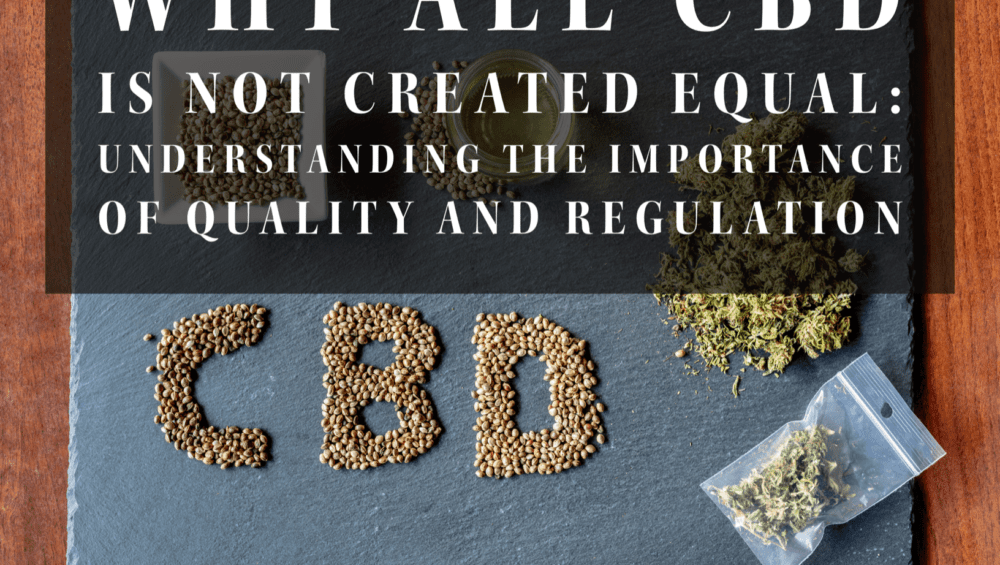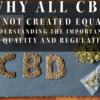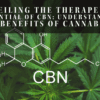
In recent years, CBD (cannabidiol) has emerged as a popular natural alternative for a variety of health conditions and symptoms. Some of the most common are pain, anxiety and insomnia, where patient seek the benefits of natural cannabinoids rather than pharmecuticals. With the increasing demand for CBD products, the market has become flooded with an array of choices, ranging from oils and edibles to topicals and capsules. However, it is essential to recognize that not all CBD products are created equal. The quality and efficacy of CBD can vary significantly depending on several factors, making it crucial for consumers to be discerning and informed. In this article, we explore the reasons why all CBD is not equal and the importance of seeking high-quality, regulated products.
Source and Quality of Hemp
The source and quality of hemp play a significant role in determining the overall quality of CBD products. Hemp is a bioaccumulator, meaning it has the ability to absorb substances from the soil in which it is grown. If hemp is cultivated in soil contaminated with heavy metals, pesticides, or other harmful substances, those contaminants can end up in the CBD extract. This is why indapendent laboratory is so vital, as consumers want to feel confortable all they are getting is natural cannabinoids and not byproducts. High-quality CBD products come from organically grown hemp, free from harmful chemicals and pesticides, ensuring a safer end product for consumers. Reputable CBD manufacturers are transparent about the source of their hemp and use third-party testing to verify the absence of harmful contaminants.
Extraction Methods
CBD can be extracted from hemp using various methods, the most common being CO2 extraction, or a solvent-based extraction. The extraction method used can impact the purity and potency of the final product. CO2 extraction is considered the gold standard as it yields a pure CBD extract without the use of harmful solvents. On the other hand, cheaper extraction methods may leave behind traces of solvents or impurities, potentially compromising the quality and safety of the CBD. Consumers should seek products that utilize CO2 extraction or other safe and efficient methods.
THC Content
CBD products are legally required to contain less than 0.3% THC (tetrahydrocannabinol), the psychoactive compound found in cannabis. While this trace amount of THC is not enough to cause intoxication, it can still show up on drug tests or have subtle effects on some individuals. Reputable CBD manufacturers provide third-party lab test results, known as Certificates of Analysis (COAs), to confirm the THC content and overall cannabinoid profile of their products. By reviewing COAs, consumers can make informed decisions about the THC content in the CBD products they choose.
CBD Concentration
The concentration of CBD in a product is another critical factor in determining its effectiveness. Some products may claim to contain a certain amount of CBD on the label but may not actually deliver the stated dosage. High-quality CBD products accurately label the CBD content and provide clear dosing instructions, allowing consumers to know precisely how much CBD they are consuming. Consistency in dosing is essential for achieving the desired therapeutic effects of CBD.
Full-Spectrum vs. Broad-Spectrum vs. Isolate
CBD products come in different formulations: full-spectrum, broad-spectrum, and CBD isolate. Full-spectrum CBD contains a wide range of cannabinoids, terpenes, and other beneficial compounds found in the hemp plant, which may work synergistically to enhance the “entourage effect.” For most patients who are tolerant of a tiny bit of THC and other cannabinoids, Full-Spectrum is a great choice. Broad-spectrum CBD is similar to full-spectrum but with the THC removed. CBD isolate, on the other hand, contains only pure CBD without any other cannabinoids. Each formulation offers unique benefits, and consumers should choose products that align with their specific preferences and needs. Some individuals may prefer the comprehensive benefits of full-spectrum CBD, while others may opt for broad-spectrum or CBD isolate if they wish to avoid any traces of THC.
Lack of Regulation
The CBD industry is relatively young, and the lack of comprehensive regulation has led to inconsistencies in product quality and safety. The U.S. Food and Drug Administration (FDA) has yet to establish clear guidelines for CBD products, leading to variations in manufacturing practices and product standards. As a result, consumers should prioritize buying CBD products from reputable companies that voluntarily adhere to Good Manufacturing Practices (GMP) and undergo third-party testing for quality assurance. Reputable manufacturers often include QR codes on their product labels, allowing consumers to access batch-specific lab test results and verify the product’s quality.
Conclusion
CBD has shown immense potential in supporting overall well-being and addressing various health conditions. However, not all CBD products are created equal, and the quality and effectiveness can vary significantly. To ensure a safe and beneficial CBD experience, consumers should be diligent in researching the sources, extraction methods, CBD concentration, and product formulations. Choosing high-quality, regulated CBD products from trustworthy manufacturers can make a substantial difference in the potential benefits one may experience. With the CBD industry continuing to evolve, advocating for more comprehensive regulation and standardized practices will ultimately lead to a safer and more consistent marketplace for CBD enthusiasts worldwide. By staying informed and discerning, consumers can make informed choices and harness the full potential of CBD for their health and well-being.




